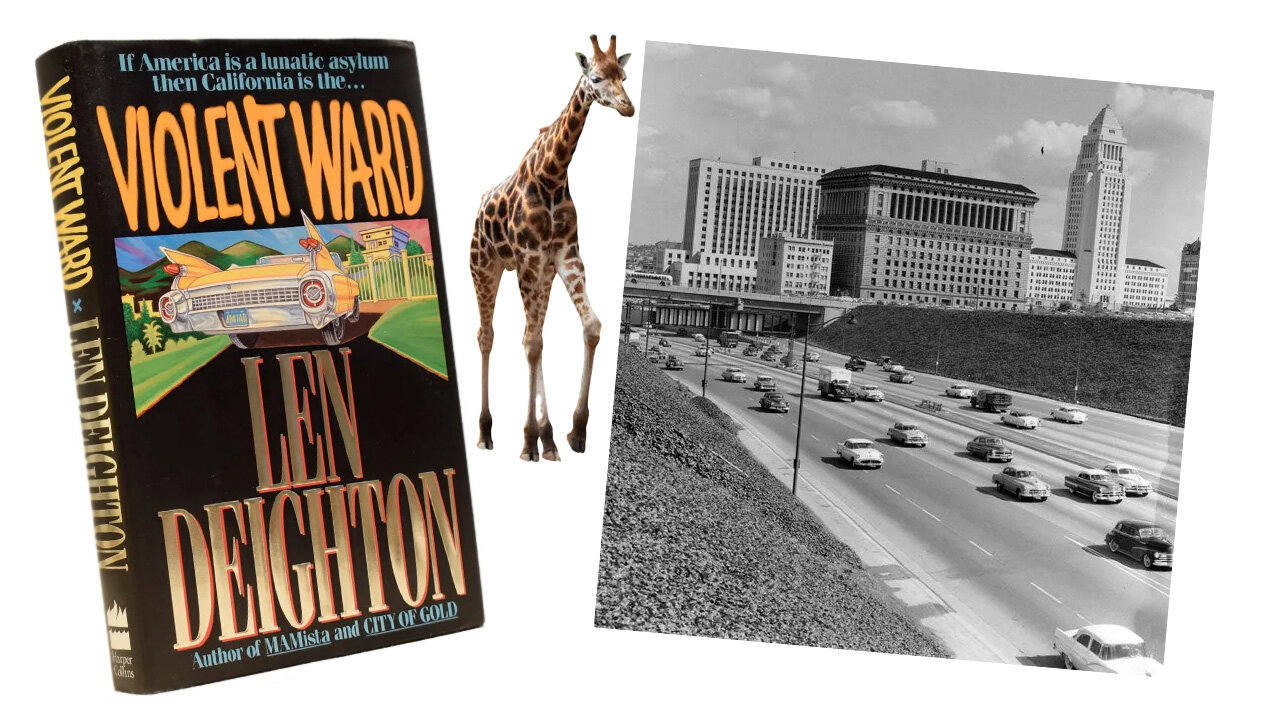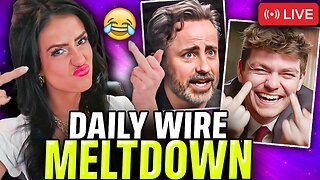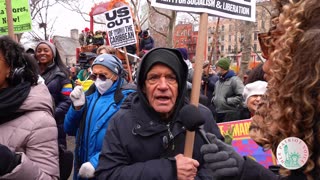Premium Only Content

'Violent Ward' (1993) by Len Deighton
Len Deighton’s, 'Violent Ward', (1993) is a darkly comic legal-noir that takes the author far from the fog of Cold War Berlin or the heat of Latin American insurgency, and drops him instead into the sunlit corruption of late 1980s Los Angeles. It is one of the most unexpected entries in Deighton’s body of work—less a spy thriller than a sardonic, Chandleresque plunge into America’s legal underbelly, filled with gangsters, crooked lawyers, sex scandals, and the slow, inescapable unraveling of a man in over his head. In tone, structure, and subject matter, it is as far from 'The IPCRESS File' as one could imagine—but it still bears Deighton’s unmistakable signature: cynicism without despair, intelligence without sentiment, and a cool, detached view of human folly.
The narrator is Mickey Murphy, a struggling, disillusioned lawyer working in the margins of L.A.’s legal world, where divorce cases, dirty money, and shady plea bargains are the norm. Murphy is not heroic; he is jaded, morally elastic, and mostly concerned with staying alive and solvent. But he’s also intelligent and wryly observant, and as he is pulled into a vortex of murder, blackmail, and political scandal, his cynicism becomes a survival mechanism. Like Philip Marlowe before him, he navigates a city where almost everyone is lying, and where the law is a business, not a principle.
What distinguishes 'Violent Ward' is not just its departure from espionage, but its sheer tonal shift. The book is blackly comic—often laugh-out-loud funny, but never in a way that undercuts its dark truths. Deighton is fascinated by the absurdities of American culture: its obsession with image, its political hypocrisy, its manic pursuit of wealth. Los Angeles becomes a character in itself—a sprawl of freeways, gated mansions, glittering surfaces, and hidden rot. The novel is laced with insider jokes about the movie business, the legal racket, and the moral gymnastics required to get through the day in a city built on illusion.
The plot is thick and tangled, but intentionally so. Deighton delights in misdirection, withheld truths, and sudden reversals. What begins as a routine legal job spirals into a conspiracy involving porn magnates, secret tapes, political blackmail, and possibly even murder. Yet the mechanics of the plot are secondary to the mood: that slow, tightening sense of paranoia as Murphy realizes that his enemies are more powerful than he thought, and his friends may not exist at all. The title, 'Violent Ward', is the name of a feared gangster whose presence hovers over the novel like a threat, but he is largely offscreen—more an idea than a character. That absence is thematic: in Deighton’s Los Angeles, the real power is always somewhere else, just out of reach, operating through proxies and middlemen.
Despite the American setting, 'Violent Ward' is very much a British novel in tone. Deighton’s wit is dry, his sentences clipped and precise, and his moral outlook unmistakably European—skeptical of institutions, amused by ambition, and quietly appalled by the ease with which people accept corruption as normal. This creates a strange but effective cultural tension: a British author dissecting American decadence with surgical detachment. Deighton is not mocking America, but he is diagnosing it, and his diagnosis is brutal. Greed, hypocrisy, and violence are not flaws in the system—they are the system.
One of the novel’s greatest strengths is its voice. Mickey Murphy is a richly drawn narrator: cynical but not heartless, smart but not all-knowing, perpetually two steps behind the game. His commentary is laced with irony, but also with flashes of genuine weariness. There is a strong current of existential despair under the surface, particularly in the way Deighton portrays the legal profession—not as a pursuit of justice, but as a series of transactions in which guilt, innocence, and morality are negotiable. Murphy’s growing realization that he is complicit in the very system he once mocked gives the novel emotional weight beneath the comedy.
That said, 'Violent Ward' is an intentionally slippery novel. Its plot resists resolution, its characters often vanish without explanation, and its conclusion is abrupt and ambiguous. For some readers, this may be frustrating; for others, it’s precisely the point. In a city of illusion, truth is elusive, and endings are rarely clean. The book doesn’t offer closure because its world doesn’t either. Instead, it offers insight—into a culture where everyone is acting, everything is negotiable, and survival often depends on knowing when to look the other way.
'Violent Ward' is an outlier in Deighton’s oeuvre, but it deserves more attention than it often gets. It is a sharp, stylish, and bleakly funny novel that captures the spirit of Los Angeles noir while injecting it with a global, postmodern cynicism. It may not be a spy story, but it is very much about espionage in the broader sense: the lies we tell others, the lies we tell ourselves, and the dangerous games played in the shadows of power. Deighton once again proves that the real action isn't in the explosions or chase scenes—it's in the quiet, deadly spaces where law, money, and morality intersect.
-
 8:41
8:41
Russell Brand
11 hours agoMy thoughts on this
91.2K23 -
 2:57:38
2:57:38
TimcastIRL
10 hours agoTHIS CROSSES THE LINE | Timcast IRL #1438
294K170 -
 58:43
58:43
Isabella Moody
8 hours agoEx Daily Wire CEO Calls Out Nick Fuentes & FAILS MISERABLY! WHEN WILL THESE ZIONISTS LEARN? RIP!
43.4K18 -
 27:22
27:22
Her Patriot Voice
12 hours ago $6.08 earnedFascists Vs REAL Venezuelans
46.9K32 -
 1:06:22
1:06:22
Sarah Westall
10 hours agoChallenger Dopplegangers No One Can Explain | Justin Harvey
62.2K25 -
 2:39:45
2:39:45
DLDAfterDark
9 hours ago $4.38 earnedIt's All A Psyop - The Globalists Are Playing Their Hand To Thin The Heard & Gain Control
48.4K3 -
 1:22:06
1:22:06
Precision Rifle Network
18 hours agoGuns & Grub - PRS Is Crazy Expensive & shotshow drops
49.7K -
 27:25
27:25
Jasmin Laine
12 hours agoJournalist TORCHES Canadian Media—“Trump Derangement Is Real”
53.7K17 -
 2:02:18
2:02:18
AlaskanBallistics
10 hours ago $3.06 earnedI Love this Gun Podcast #87
36.1K3 -
 1:04:39
1:04:39
BonginoReport
12 hours agoTop Dems Keep Making Violent Threats - Nightly Scroll w/ Hayley (Ep. 224)
247K136